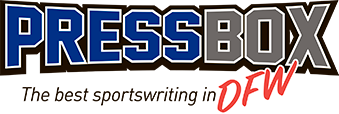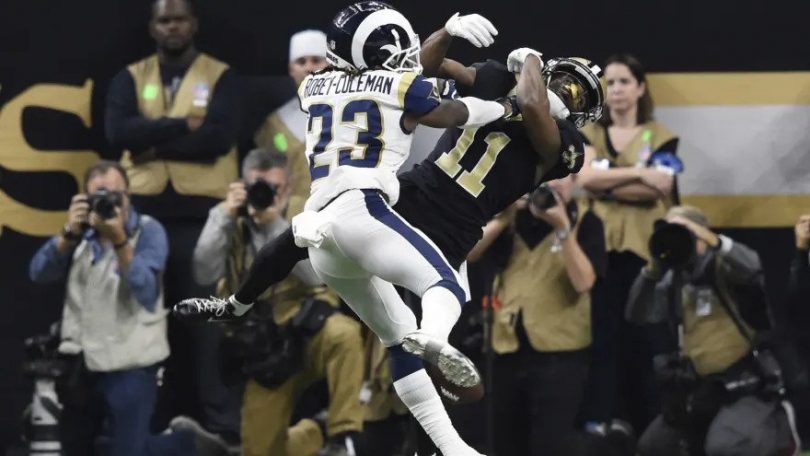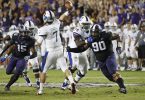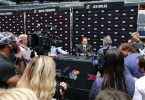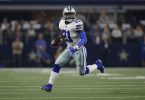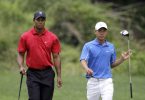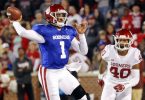NEW ORLEANS — In the visitors locker room, there was no remorse.
If confession, in fact, is good for the soul, the Rams’ Nickell Robey-Coleman was reveling in it.
“Oh, hell yeah,” he cackled. “That was P.I. [pass interference]
“Because I didn’t look back at the ball. I didn’t play the ball. If I had played the ball, it would’ve been a different story.
“But I just went straight to him and I saw his hands go up and I hit him. I heard the crowd go crazy, and I was like, oh, this is a flag. When I got up, the ref said incomplete.
“I didn’t argue. I was like, OK, cool.”
Except it wasn’t cool, of course. The Saints were livid. The giant video boards at the Mercedes-Benz Superdome showed the play at least six or seven times.
The Saints saw it was blatant pass interference. The howling 73,028 at the Superdome saw it was pass interference. A dozen or more FOX cameras had shown the whole world and Troy Aikman that it was pass interference. And, as New Orleans coach Sean Payton would reveal after the 26-23 overtime defeat, even the officials’ boss at the NFL office said it was pass interference.
So how did the seven men in striped shirts not see that the LA Rams nickel back had not only hurled himself into Saints receiver Tommylee Lewis early, but also perpetrated the misdeed helmet-first?
A pool reporter from the assembled media was sent to the officials locker room to inquire, as NFL protocol allows. Here’s how that went, verbatim:
Reporter: What was the reason that there was no penalty flag called on the Drew Brees pass to Tommylee Lewis?
Referee Bill Vinovich: It was a judgment call by the covering official. I personally have not seen the play.
Reporter: Did the timing in the game have any impact on the no-call there?
Vinovich: Absolutely not.
Reporter: In this situation, is the play subject to an instant replay review?
Vinovich: It is not a reviewable play.
End of interview. The pool reporter, Amie Just of the New Orleans Times-Picayune, could probably see she was caught in a pointless loop.
But tell me, how can Vinovich cowardly get away with saying he “did not see the play”? It was replayed over and over on the big video boards, not only right after the non-call, but throughout the commercial break after the Saints kicked their field goal. The stadium PA announcer even had to caution the crowd not to throw objects on the field.
But no flag. Not even a brief huddle among officials to make sure they got the non-call right.
Football officials huddle for everything these days – was it targeting? should we pick up the flag? do we need to put one second back on the clock? And yet, in a singular play that directly determines who wins and gets to go to the Super Bowl, Vinkovich and his band of thieves don’t even briefly confer to make sure they got it right?
Payton, still visibly shaken, said later that he had just gotten off the phone with the NFL’s senior vice-president of officiating, Alberto Riveron.
“It was simple,” Payton said of the phone call. “They blew the call. It should never have not been a call. They said not only was it interference, it was helmet to helmet.”
At the other end of the Superdome, a decidedly different scene was unfolding. The Rams’ consensus response to the controversial non-call was a half-hearted shake of the head, followed by the old line about how “no one play determines who wins and loses.”
Except this one precisely did. The Saints would have had first-and-goal at the LA 5-yard line with just 1:45 remaining on the game clock.
“It was a bang-bang type play,” said Rams coach Sean McVay. “The one thing I respect about the refs today is they let the guys compete and they let the guys play. I thought Nickell Robey made a nice play.”
It was a cheeky answer for a guy who’s supposed to be classier and smarter than that. McVay is supposed to be a football genius. If that play had happened to his team, under those same game circumstances, there’s no way he would have been patting the officials on their rumps for letting the boys play.
In the search for a historical perspective, I tried to weigh where Sunday’s blown call fits into the NFL’s long line of officiating transgressions.
The “tuck rule” Tom Brady fumble certainly belongs on the list. The Jerry Rice fumble that wasn’t called in the 1999 wild card game against the Packers also merits a place. Vikings fans still whine that the Cowboys’ Drew Pearson pushed off on the Hail Mary play in the 1975 NFC Championship Game.
And then there’s the Dez Bryant play against the Packers, originally ruled a catch but reviewed and overturned.
But this one was the worst of all, duly captured in 4K on network TV. There was no subtlety involved. Even the defensive back who launched the assault admitted his guilt.
“Yeah, they’re going to show that forever,” Robey-Coleman said. “New Orleans is going to hate me.
“But it’s fine. I’m going back to LA.
“Hey, Saints fans, I’m sorry. You heard what the ref said. Respect the call. It is what it is.”
Rams PR people did a slyly effective job of disregarding the controversial play Sunday – itself an admission that they knew the non-call was dubious. Questions to the other Rams about pass interference were ignored on the postgame quote sheets.
Well, whatever. The questions will follow the Rams to Atlanta.
In the meantime, the league has a problem. The competency of its officials has been under scrutiny. The league is moving to Las Vegas, where monkey business like Sunday’s just isn’t tolerated.
I’m not suggesting that somebody might break a few legs over a blown call, but to quote Nickell Robey-Coleman, destined for a place in NFL playoff infamy, it is what it is.
